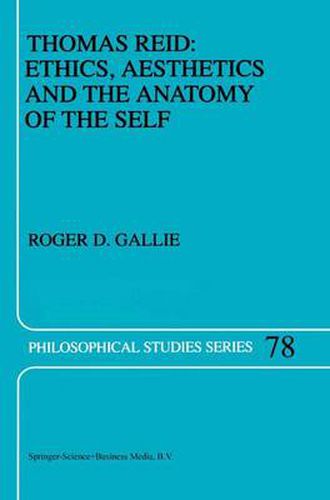Readings Newsletter
Become a Readings Member to make your shopping experience even easier.
Sign in or sign up for free!
You’re not far away from qualifying for FREE standard shipping within Australia
You’ve qualified for FREE standard shipping within Australia
The cart is loading…






This title is printed to order. This book may have been self-published. If so, we cannot guarantee the quality of the content. In the main most books will have gone through the editing process however some may not. We therefore suggest that you be aware of this before ordering this book. If in doubt check either the author or publisher’s details as we are unable to accept any returns unless they are faulty. Please contact us if you have any questions.
This book is a critical exposition of Reid’s philosophical anatomy of the self, his moral philosophy and his aesthetics, and is aimed at an advanced undergraduate and graduate readership. Those familiar with Reid scholarship will be only too aware of how little attention has been paid of late to Reid’s accounts of beauty, of sublimity and aesthetic assessment, compared with his moral philosophy and philosophy of action. One main purpose of this book is to help remedy this imbalance, if only because of the very considerable impact of Reid’s aesthetic thought in nineteenth century France. Notoriously Reid presents his accounts of moral and aesthetic judgment as the fruits of a sense of morals and of taste. Accordingly his position on the nature of a sense needs to be carefully considered, as well as his position on the origin of conceptions needed for the deployment of a sense. The Lehrer-Smith III computational computer model of Reidian faculties is assessed at some length as a serious contribution to this task, especially since its employment would seem to presuppose positions at odds with crucial components in Reid’s account, which is also presented in the book, of the self as thinker, decision-maker and moral agent exercising both active and speculative power.
$9.00 standard shipping within Australia
FREE standard shipping within Australia for orders over $100.00
Express & International shipping calculated at checkout
Stock availability can be subject to change without notice. We recommend calling the shop or contacting our online team to check availability of low stock items. Please see our Shopping Online page for more details.
This title is printed to order. This book may have been self-published. If so, we cannot guarantee the quality of the content. In the main most books will have gone through the editing process however some may not. We therefore suggest that you be aware of this before ordering this book. If in doubt check either the author or publisher’s details as we are unable to accept any returns unless they are faulty. Please contact us if you have any questions.
This book is a critical exposition of Reid’s philosophical anatomy of the self, his moral philosophy and his aesthetics, and is aimed at an advanced undergraduate and graduate readership. Those familiar with Reid scholarship will be only too aware of how little attention has been paid of late to Reid’s accounts of beauty, of sublimity and aesthetic assessment, compared with his moral philosophy and philosophy of action. One main purpose of this book is to help remedy this imbalance, if only because of the very considerable impact of Reid’s aesthetic thought in nineteenth century France. Notoriously Reid presents his accounts of moral and aesthetic judgment as the fruits of a sense of morals and of taste. Accordingly his position on the nature of a sense needs to be carefully considered, as well as his position on the origin of conceptions needed for the deployment of a sense. The Lehrer-Smith III computational computer model of Reidian faculties is assessed at some length as a serious contribution to this task, especially since its employment would seem to presuppose positions at odds with crucial components in Reid’s account, which is also presented in the book, of the self as thinker, decision-maker and moral agent exercising both active and speculative power.